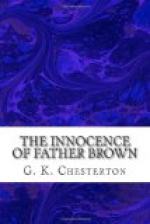“The great white horse which had marched slowly down the road, as it had marched in so many processions, flew back, galloping up the road towards them as if it were mad to win a race. At first they thought it had run away with the man on its back; but they soon saw that the general, a fine rider, was himself urging it to full speed. Horse and man swept up to them like a whirlwind; and then, reining up the reeling charger, the general turned on them a face like flame, and called for the colonel like the trumpet that wakes the dead.
“I conceive that all the earthquake events of that catastrophe tumbled on top of each other rather like lumber in the minds of men such as our friend with the diary. With the dazed excitement of a dream, they found themselves falling—literally falling— into their ranks, and learned that an attack was to be led at once across the river. The general and the major, it was said, had found out something at the bridge, and there was only just time to strike for life. The major had gone back at once to call up the reserve along the road behind; it was doubtful if even with that prompt appeal help could reach them in time. But they must pass the stream that night, and seize the heights by morning. It is with the very stir and throb of that romantic nocturnal march that the diary suddenly ends.”
Father Brown had mounted ahead; for the woodland path grew smaller, steeper, and more twisted, till they felt as if they were ascending a winding staircase. The priest’s voice came from above out of the darkness.
“There was one other little and enormous thing. When the general urged them to their chivalric charge he half drew his sword from the scabbard; and then, as if ashamed of such melodrama, thrust it back again. The sword again, you see.”




